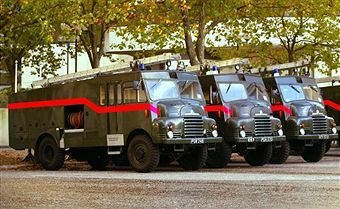 The Fire Brigade’s Union (FBU) have called for strike action in London during the
busiest firefighting night of the year: Bonfire Night. Attempts to renegotiate work patterns (already changed in several fire brigades but unchanged in London for thirty years) have been
hysterically termed ‘sacking’ all London firefighters by the union. Rather like the threatened British Airways strike during Christmas 2009, this is a clear attempt by a trade
union to use its monopoly power to force an employer into accepting its terms by inflicting maximum possible damage on the general public.
The Fire Brigade’s Union (FBU) have called for strike action in London during the
busiest firefighting night of the year: Bonfire Night. Attempts to renegotiate work patterns (already changed in several fire brigades but unchanged in London for thirty years) have been
hysterically termed ‘sacking’ all London firefighters by the union. Rather like the threatened British Airways strike during Christmas 2009, this is a clear attempt by a trade
union to use its monopoly power to force an employer into accepting its terms by inflicting maximum possible damage on the general public.
This is clearly worse than a normal strike, however. If, say, all Asda employees went on strike, we could shop at Tesco or another supermarket. In the case of British Airways, many people
were concerned that they could not book alternative tickets as BA is the sole carrier on certain routes. However, both of these are essentially forms of inconvenience and very unlikely to be
life-threatening, which is clearly not the case for firefighters. Their refusal to carry out their duty could literally mean the difference between life and death – and on the most dangerous
night of the year.
The 2002/3 dispute provides a reminder of how serious this is. Despite having around 40 applicants for every vacancy, the FBU demanded a 40 percent pay award. When this was rejected, a
nationwide ballot was held and firefighters across the country went on strike. The Armed Forces were forced to take their place. Unable to cross the picket lines to gain access to modern fire
engines and equipment, the Army had to use its own stock of ancient ‘Green Goddesses’, the last of which was produced in 1956 and which have lower speed, shorter ladders, less water and
lower pressure. Though the Armed Forces were widely praised for their performance during the strike (and firefighters sometimes crossed the picket lines to help) the risk to life was and is
obvious.
The ‘Green Goddesses’ will not be used this time – non-unionised firefighters, with a fraction of the normal engines in service, have to shoulder the responsibilities of the
entire workforce whenever there is a strike – allegedly at times in the face of union intimidation. But this is clearly unsatisfactory. One option would be to recognise – as
Policy Exchange explored in our recent paper Modernising Industrial Relations – that firefighters provide a
life-sustaining service which cannot be curtailed by strike action. This is already the case for the Army and the police. It is also clearly allowed by the European Convention of Human
Rights which allows the curtailment of strike action in the interests of ‘public safety [or] the protection of health… of others’. Many countries already do this. The
right approach would be to allow organisations to apply for judicial review to revoke statutory strike immunities if they would imperil the safety of the general public. For firefighters, the case
could not be clearer.
Ed Holmes is a Research Fellow in Policy Exchange’s Economics Unit.






Comments